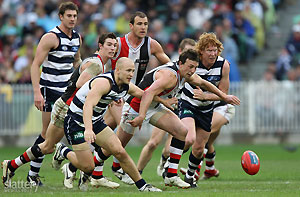
I don’t envy the job of commentators when it comes to Australian football. It might look easy, but there is a reason why most radio and television coverage uses two callers as well as a posse of expert comments men.
Compared to other codes, the action can be so frantic and uninterrupted that even the commentators need a spell on the bench.
But the difficulties go further than this.
Australian football is also very hard to analyse. It is a game of momentum swings that often appear to happen for no reason. Team X can dominate Team Y for a quarter and then the whole thing turns around as if they’d all swapped shirts.
Why?
Faced with having to explain why this highly unstructured sport unfolds the way it does, AFL commentators resort to clichés. Winning teams, we are told, get ‘numbers to the ball’ or are ‘hard at it’. Even more mysteriously, players are said to be ‘playing for each other’, ‘playing with confidence’ or ‘having a day out’.
These terms probably mean something to someone, but I have my doubts. How can a player play without ‘confidence’ for three quarters and then, exploding into life, somehow find it in the last?
As I say, I don’t envy the job of commentators. The answers to these questions probably sit alongside the workings of the quantum universe and the mass appeal of television cooking shows, beyond the grasp of mere mortals.
Not being able to explain – really explain – Australian rules football is no crime and if clichés save us from silence in the commentary box, so be it. However, consider the recent Collingwood-Carlton blow-out.
For most of the afternoon it looked a bit like men versus boys and at one stage the winning margin threatened to easily top the ton. At the end, one of the radio commentators I regularly listen to put Carlton’s performance down to a lack of ‘heart’. For this ex-player, the Blues needed to remember that football was a team game and that they had let the club and their supporters down by their pathetic effort.
In fact, according to this particular expert, as with many others, the explanation is ALWAYS about ‘heart’. Football, he says, is about courage and pride and character and guts and, well, manliness.
He is not alone. Talking about the ‘ticker’ of players is a disease that has been in football commentary forever but it is spreading.
Coaches have the disease too. Brett Ratten questioned the commitment of his players after the Collingwood game. Why? Was it because he was at a loss to explain the result any other way? Because, actually, he didn’t know why Carlton were so badly beaten?
And cast your mind back 10 months to Ross Lyon’s speech at St Kilda’s end of year function where he asked that only players with enough desire and hunger to go the extra yard need sign on for another year. At the time, the football media said it was a stirring, important address.
It wasn’t. It was hot air.
Explaining the results of football matches and the success of clubs by talking about ‘heart’ and ‘courage’ and ‘commitment’ is utterly meaningless. Nobody knows how much heart players and clubs have. Didn’t anyone notice the way Carlton rallied in the second half of the Collingwood match, avoiding a monumental hiding? Didn’t this show courage? Why was courage missing the first half of the game but some semblance of it there in the second?
Heart has nothing to do with who wins and loses football matches. Why? Because all clubs have players who want to win. If we could measure heart – and we can’t – I think we would find that teams are pretty evenly matched and that highly determined players are equally sprinkled across all teams.
Some said that St. Kilda were pipped in last year’s Grand Final because Geelong had just a little bit more ‘steel’ and never-say-die spirit when it really mattered. Were they right?
Or were they just lucky the siren went when it did? Perhaps it was that St Kilda just didn’t kick straight under pressure?
If football is about heart and courage then why do the experts only ever talk about it after the result? Why don’t we ever hear them say ‘I think the Bulldogs will beat Hawthorn today because they have more courage’?
The reason we never hear this is because the heart explanation is not an explanation at all but a rationalisation. It is something that commentators, coaches and fans use to fill in the silence when they don’t know what else to say.
Often, perhaps mostly, results in Australian football are impossible to explain. But surely skill level, fitness, tactics, match-ups and a dozen other things are at least a better place to start than the insulting nonsense we hear each weekend about heart and courage.
But the spread of heart disease in football commentary does serve one purpose. It helps us all to forget that players play for money, a lot of money. As long as we can convince ourselves that they are doing it out of sheer love and passion for the game and their club, we can forget about the flashy cars they drive and the spiraling ticket prices that pay for them.
In fact, the more money the players get, the more people talk about heart. And this is why we now have a franchise, albeit in a different football code, called – of all things – the Melbourne Heart.
Is this just a coincidence, or did the person who dreamed this up really understand the psychology of the modern sports fan? That the thing he or she most fears is that our boys are doing it for the money and not, in the end, for you and me.





























































































